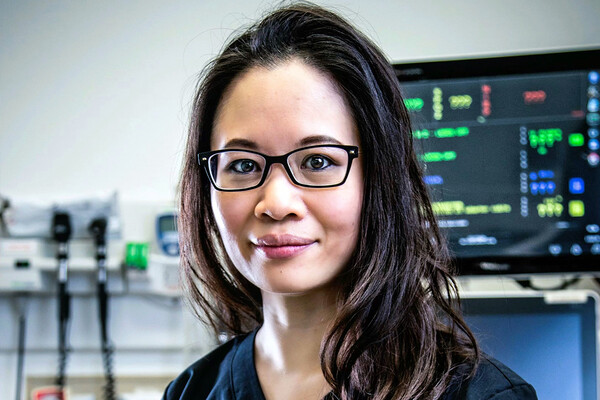Breadcrumbs
- Home
- MD/PhD Program
- News
- A new curriculum for the first two years of medical school launches
A new curriculum for the first two years of medical school launches
The new Foundations Curriculum launches at the start of this academic year for first year MD Program students. MD Program Vice Dean Dr. Patricia Houston explains what the new curriculum is all about.
 What is new about the new curriculum?
What is new about the new curriculum?
Dr. Houston: The Foundations Curriculum is the most significant change we have made to the way we deliver medical education in over two decades. Through the new curriculum, we are harnessing technology to enable students to learn at their own pace, providing them with the flexibility to pursue passions and interests that complement their medical education.
The curriculum takes a highly integrated approach that allows students to connect the dots between basic science and clinical medicine knowledge content and the relevant clinical skills and attitudes practiced in the context of our health care environment. Case-based learning allows students to apply their knowledge to virtual patients demonstrating real-life clinical problems.
Our students will be assessed in a way that is tailored to their level of learning and the competency being assessed. Frequent lower-stakes assessments with formative feedback and individualized coaching are designed to support learning.
What impact will these changes have on our students?
Dr. Houston: Our goal is to create an engaging and rewarding experience for our students and teachers alike.
The focus of the curriculum is on longitudinal learning and the development of relationships. The curriculum structure is set up to reflect this. Our courses run sequentially with components and themes interwoven throughout – encouraging teachers to build relationships with students as their advisors, mentors and advocates.
Content is thematically linked and integrated across multiple learning activities and modalities such as lectures, small expert-led group seminars, case-based learning, small-group workshops, community placements and clinical skills sessions. To maximize the use of classroom time and enable a greater depth of content exploration, students are introduced to content through online materials and other resources prior to their classroom sessions.
The Foundations Curriculum also responds to our students’ desire for experiential learning and mirrors the way physicians practice medicine. Small-group case-based learning enables students to get a feel for what it’s like to work through a real clinical encounter with a health care team, so that they are prepared to participate in collaborative learning across health care disciplines.
Similarly, student assessment will involve identifying each individual student’s longitudinal competency development and learning outcomes through an entire education program — not just a single course or module.
What prompted the development of a new curriculum?
Dr. Houston: Over the last 20 years, the way we practice medicine has changed a great deal. Innovations in technology, shifts in population demographics and resources are impacting people’s experiences and expectations. To ensure our students are prepared to adapt to our ever-changing context and be the health care leaders of tomorrow, we are training our students to embrace change and start down the path to becoming life-long learners.
The evidence-based changes to our curriculum are supported by the most current medical education research and scholarship. We engaged broadly with a wide-range of experts, alumni, health care leaders, faculty, students and the education research community to design and build the new curriculum and assessment program so that it effectively builds upon evidence-informed best practices, and meets the needs of our students.
We will be continually seeking feedback on the new curriculum from students and teachers, making changes as necessary. Cultivating a learning environment that is responsive and continuously improving is our top priority.
How can students and teachers provide feedback?
Dr. Houston: There are a number of ways students can provide feedback. We will be hosting Foundations Forums throughout the year where students can speak directly to Dr. Marcus Law, Foundations Director. They can may provide feedback through their student leadership, or their Course Director.
Teachers can approach their relevant Course Director or Dr. Law with any suggestions or ideas.
I want to hear from you and my door is always open.
The launch of the new curriculum is the exciting beginning of our life-long process that will adjust and respond based on your feedback. We’re looking forward to hearing from you.
News


